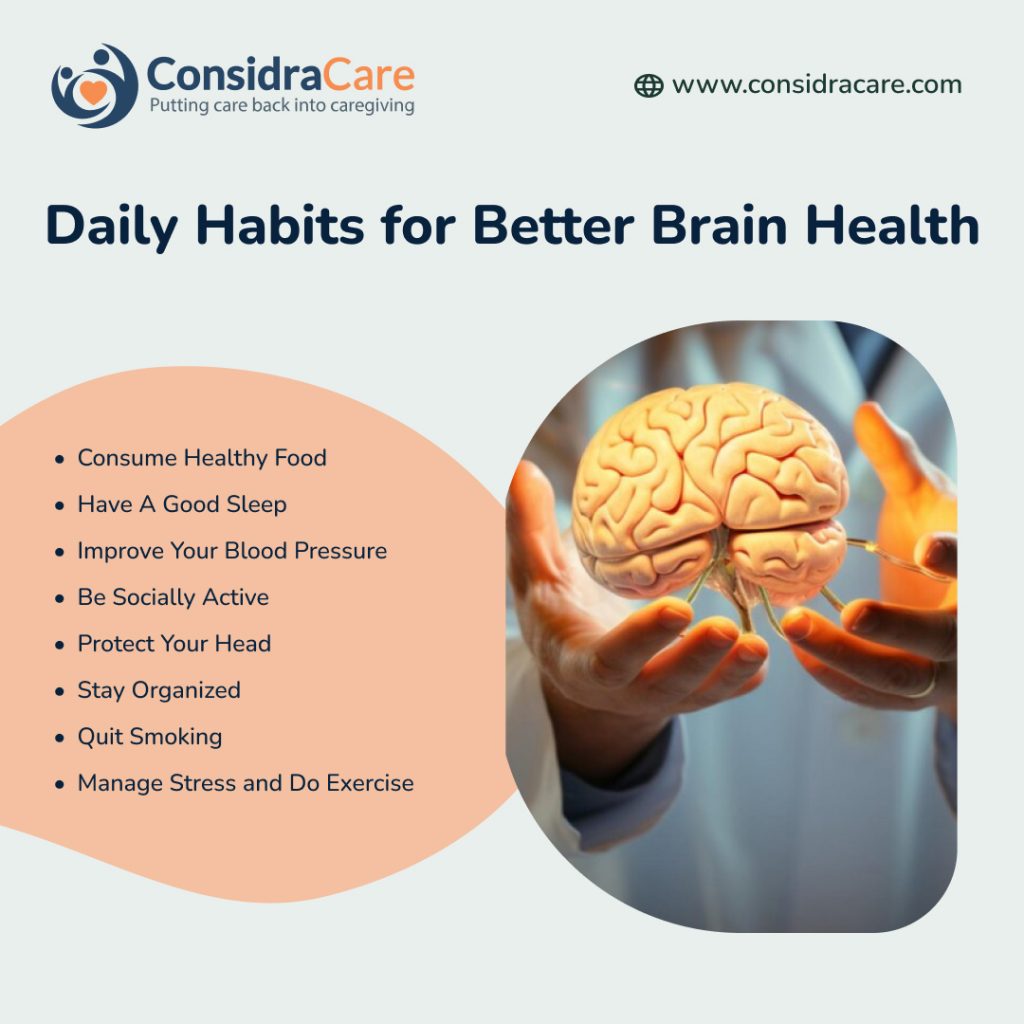You want to spend your golden years in peace, just like everyone else. So, to achieve this, maintaining cognitive and mental health is essential. In this article, we will share a few tips and tricks to help you age well.
Every 1 in 5 Canadians experiences a mental illness. It’s time you take action to combat this and any potential challenges it may present.
Table of Contents
ToggleWhat is the Difference Between Cognition & Mental Processes?
We can say that;
Mental process is the “how” (mechanisms and steps) of the mind, while cognition is the “what” (the overall abilities and functions)
What are the Signs and Symptoms of Poor Mental Health?
Mental health refers to emotional, psychological, and social well-being. Poor mental health can affect how we think, feel, and act. Common signs include:
- Persistent Sadness or Low Mood
- Anxiety or Excessive Worry
- Irritability and Mood Swings
- Withdrawal from Social Activities
- Changes in Sleep Patterns
- Fatigue and Low Energy
- Difficulty Concentrating
- Feelings of Worthlessness or Guilt
- Changes in Appetite or Weight
- Increased Use of Substances
- Thoughts of Self-Harm or Suicide
- Physical Symptoms (Headaches, stomachaches, muscle tension, and other unexplained physical symptoms can sometimes be associated with mental health problems, particularly anxiety and stress)
What are the First Signs of Cognitive Decline?
The first signs of cognitive decline can be subtle and may vary from person to person. Here are some common early indicators:
- Memory Problems: Frequent forgetfulness of recent events or appointments that disrupt daily life.
- Word-Finding Issues: Struggling to recall common words during conversations or substituting them with inappropriate terms.
- Problem-Solving Difficulties: Trouble planning, making decisions, or following step-by-step instructions.
- Poor Judgment: Making unusual decisions, mishandling money, or neglecting personal care.
- Disorientation: Getting lost in familiar places or losing track of time and dates.
- Routine Task Challenges: Difficulty performing familiar tasks, like cooking or managing finances.
- Misplacing Items: Frequently placing objects in odd spots and being unable to retrace steps to find them.
- Mood or Personality Changes: Experiencing mood swings, irritability, or withdrawal from social activities.
What Triggers Cognitive Decline?
There are various causes that increase the likelihood of cognitive decline. Aging is one of the most significant risk factors for cognitive decline. Aside from aging, other risk factors for mental dysfunction and other difficulties are:
- Poor diet
- Smoking
- Brain injury
- Excessive alcohol consumption
- Sleep issues
- Social isolation
- Depression
- Drugs, toxins
- Diseases such as Stroke, brain cancer, Parkinsons, heart diseases and injuries
Read More: How to Preserve Cognitive Health in Older Age?
Tips for Improved Cognitive & Mental Health:
Maintaining good brain health is essential for overall well-being and reducing the risk of cognitive decline. Here are some key insights and tips to help you improve your mental and cognitive health:

1. Eat a Balanced Diet:
Dash or Mediterranean diet is beneficial in lowering the risk of dementia incidence. This diet emphasizes consuming plant-based foods, whole grains, and healthy fats. Below are the key points to keep in mind regarding Mediterranean diet for seniors:
- Incorporate more fruits, vegetables, and nuts into your meals.
- Choose whole grains over refined grains for improved brain health.
- Include healthy fats such as olive oil and fatty fish in your diet.
Research has shown that women who adhere to the Dietary Approaches to Stop Hypertension (DASH) diet may experience a reduced risk of cognitive decline later in life.

Incorporating nutrient-dense foods into your diet while minimizing processed and high-sugar foods can significantly boost cognitive health and reduce the risk of cognitive decline.
2. Prioritize Physical Activity:
Regular exercise, especially cardiovascular activities, is known to have positive effects on cognitive health. Engaging in physical activities on a regular basis can help reduce the risk of cognitive decline. Here are some suggestions for physical activities that benefit the brain health of seniors:
- Walking is a simple and accessible exercise that can be done anywhere.
- Biking or cycling is a low-impact cardiovascular exercise that promotes brain health.
- Jogging or running can have significant positive effects on cognitive function.
3. Stay Connected and Social:
Maintaining an active social life is important for overall health and well-being and can also play a role in preventing cognitive decline and disabilities. Here are some ideas for regular socializing for senior citizens:
- Foster connections with family and friends through regular phone calls.
- Join local clubs or organizations to meet new people with similar interests.
- Volunteer for community projects or causes that are meaningful to you.
- Take educational classes or attend workshops to engage with others and stimulate your mind.

4. Maintain Quality Sleep:
Getting enough quality sleep is essential for cognitive function and emotional well-being. Here are some tips for improving your sleep routine:
- Stick to a regular sleep schedule, going to bed and waking up at the same time each day.
- Aim for 7-8 hours of sleep every night to support optimal brain health.
- Create a relaxing bedtime routine that includes activities like reading or taking a warm bath.
Read More: How to Improve Senior Mental Health-12 Practical Ways!
5. Get Mental Stimulation:
Engaging in activities that challenge the brain helps keep cognitive functions sharp. Activities like puzzles, reading, playing strategy games, learning a new skill (e.g., playing an instrument), or taking up a new hobby can stimulate different areas of the brain. Mental stimulation encourages the formation of new neural connections, which is vital for maintaining cognitive health as you age.
6. Protect Yourself from Falls and Injuries:
Falls can cause head injuries, which may lead to cognitive problems. To protect against falls, make your home safer by removing tripping hazards (like loose rugs or clutter), installing grab bars in the bathroom, and ensuring proper lighting in walkways. Balance and strength exercises, such as tai chi or yoga, can enhance stability and prevent falls. Additionally, regular eye check-ups and proper footwear can reduce the risk of stumbling and falling.
Read More: How to Care for Seniors with Vision Problems
7. Focus on Your Health:
Taking care of your blood pressure, and keeping blood sugar and cholesterol levels within a healthy range is crucial as;
- High blood pressure can damage blood vessels in the brain, increasing the risk of stroke, cognitive decline, and conditions like dementia.
- High blood sugar, especially in diabetes, can damage blood vessels and nerves, affecting brain function and memory.
- High levels of bad cholesterol (LDL) can lead to plaque buildup in arteries, reducing blood flow to the brain and increasing the risk of vascular dementia and other cognitive impairments.
Testing Cognitive and Mental Fitness: 5 Health Assessments
- Mini-Mental State Examination (MMSE): A quick test that evaluates memory, attention, language, and visual-spatial skills. It includes tasks like recalling words and spelling. Useful for detecting cognitive impairment.
- Montreal Cognitive Assessment: More sensitive than the MMSE, this 10-15 minute test assesses memory, attention, language, and abstract thinking to detect early signs of cognitive decline.
- Clock-Drawing Test (CDT): A simple task of drawing a clock to assess visuospatial skills, memory, and executive function. Difficulty in this test may indicate cognitive issues.
- Trail Making Test (TMT): Measures cognitive flexibility and attention. Involves connecting numbers or alternating between numbers and letters. Longer completion times can suggest cognitive impairment.
- Geriatric Depression Scale (GDS): A questionnaire to screen for depression, which can affect cognitive functions like memory and concentration.
These assessments help in early detection of cognitive and mental health issues. Consult a healthcare professional for a detailed evaluation.
Which Medications Affect Cognition?
- Anticholinergics: Often used for allergies and gastrointestinal issues can lead to confusion, memory problems, and even delirium. Stopping these drugs often improves cognitive function.
- Anxiety and Insomnia Medications: Medications for insomnia, including certain over-the-counter sleep aids, often contain ingredients with sedative effects.
- Muscle Relaxants: These medications are often used to relieve muscle spasms or tension. However, they can have sedative effects, leading to drowsiness, confusion, and impaired cognitive function in older adults.
- Allergy Medications: Older antihistamines can impair memory, slow response times, and cause drowsiness. Newer alternatives have fewer cognitive effects.
Conclusion:
Maintaining brain health is crucial in an older population like in Canada. The fact that 4,000 Canadians commit suicide each year shows the widespread impact of mental health disorders on all ages and backgrounds. Lifestyle modifications include a balanced diet, frequent exercise, social interaction, quality sleep, and mental stimulation can improve senior cognitive and mental health. These practices can reduce cognitive decline risks and ultimately improve quality of life.
Want to learn more?
Reach us at wecare@considracare.com, or call us at 1-855-410-7971, and we will be happy to assist. Discover more tips in our information booklets or on our resources page.
FAQs:
1. What is the link between Alzheimer’s and mental health?
Mental health issues like depression and anxiety can be linked to an increased risk of developing Alzheimer’s disease. Chronic stress and mental health conditions can contribute to inflammation and changes in the brain that might lead to cognitive decline. While mental health problems do not directly cause Alzheimer’s, managing mental well-being can help reduce overall risk and improve quality of life for those affected by Alzheimer’s.
2. Are mental health issues cognitive?
Mental health issues and cognitive problems are related but distinct. Mental health issues, such as depression, anxiety, and mood disorders, primarily affect emotional and psychological well-being. Cognitive issues, however, involve mental processes like memory, thinking, and problem-solving. However, mental health problems can impact cognitive functions, resulting in issues like memory problems, difficulty concentrating, and decision-making challenges.
3. What are 3 habits to prevent cognitive decline?
Eating a balanced diet rich in fruits, vegetables, and omega-3s; engaging in regular physical activity; and keeping the brain mentally active through activities like reading, puzzles, and learning new skills.
4. What is the best brain booster for seniors?
There is no single “best” brain booster. However, activities like puzzles, reading, learning new hobbies, and engaging in social interactions can effectively stimulate the brain and support cognitive health.
5. How to activate your brain?
Challenge your brain through activities like solving puzzles, learning new skills (e.g., playing an instrument or learning a language), and participating in social interactions to keep your mind sharp and engaged.
6. What are some tips for improving a sleep routine?
Maintain a consistent sleep schedule, aim for 7-8 hours of sleep each night, and create a relaxing bedtime routine by avoiding screens, caffeine, and heavy meals before bed.
7. What is the 5 cognitive instruments test?
The Five Cognitive Tests (5-Cog) is a screening tool designed to detect cognitive decline in older adults. It assesses cognitive functions across five key areas: attention, memory, visuospatial skills, language, and reasoning. Each subtest targets a different cognitive domain to provide a comprehensive evaluation, making the 5-Cog an effective instrument for identifying early signs of cognitive impairment in a group setting.

Fakiha is an experienced writer at ConsidraCare with an optimistic interest in life. She has a proactive approach to improving health and wellness for seniors. She offers well-researched and thoughtful information to help individuals make informed healthcare decisions for themselves and their loved ones.



